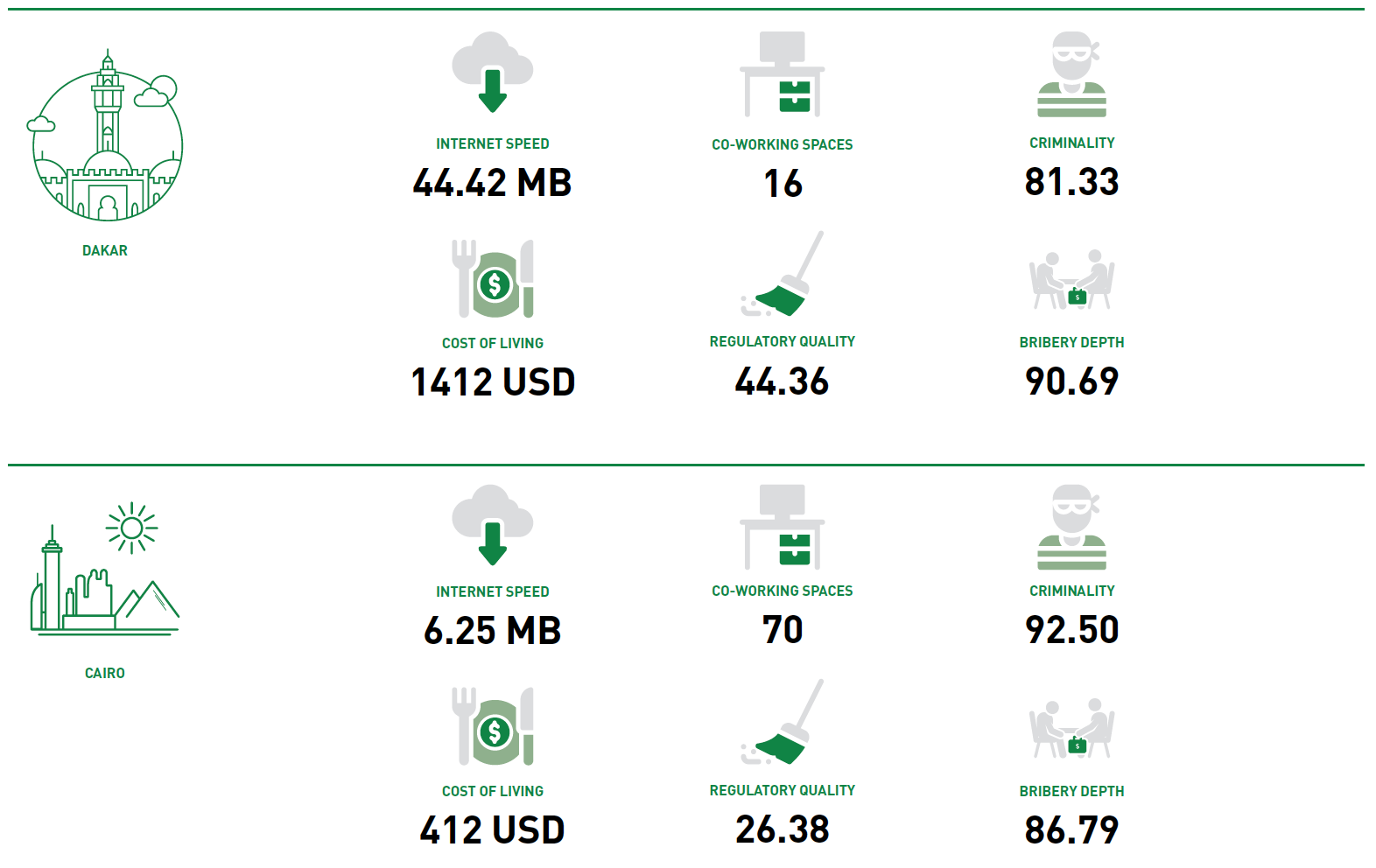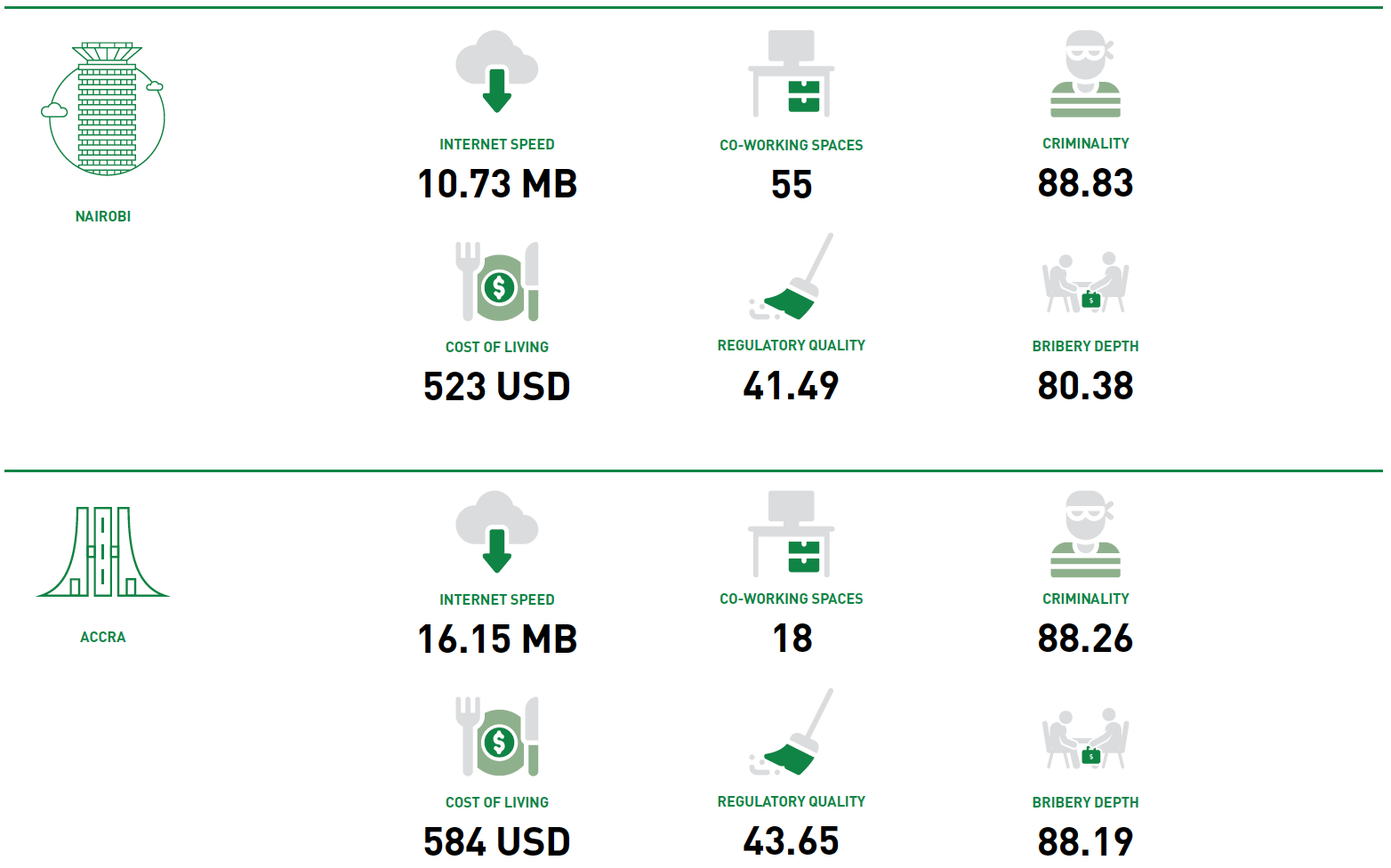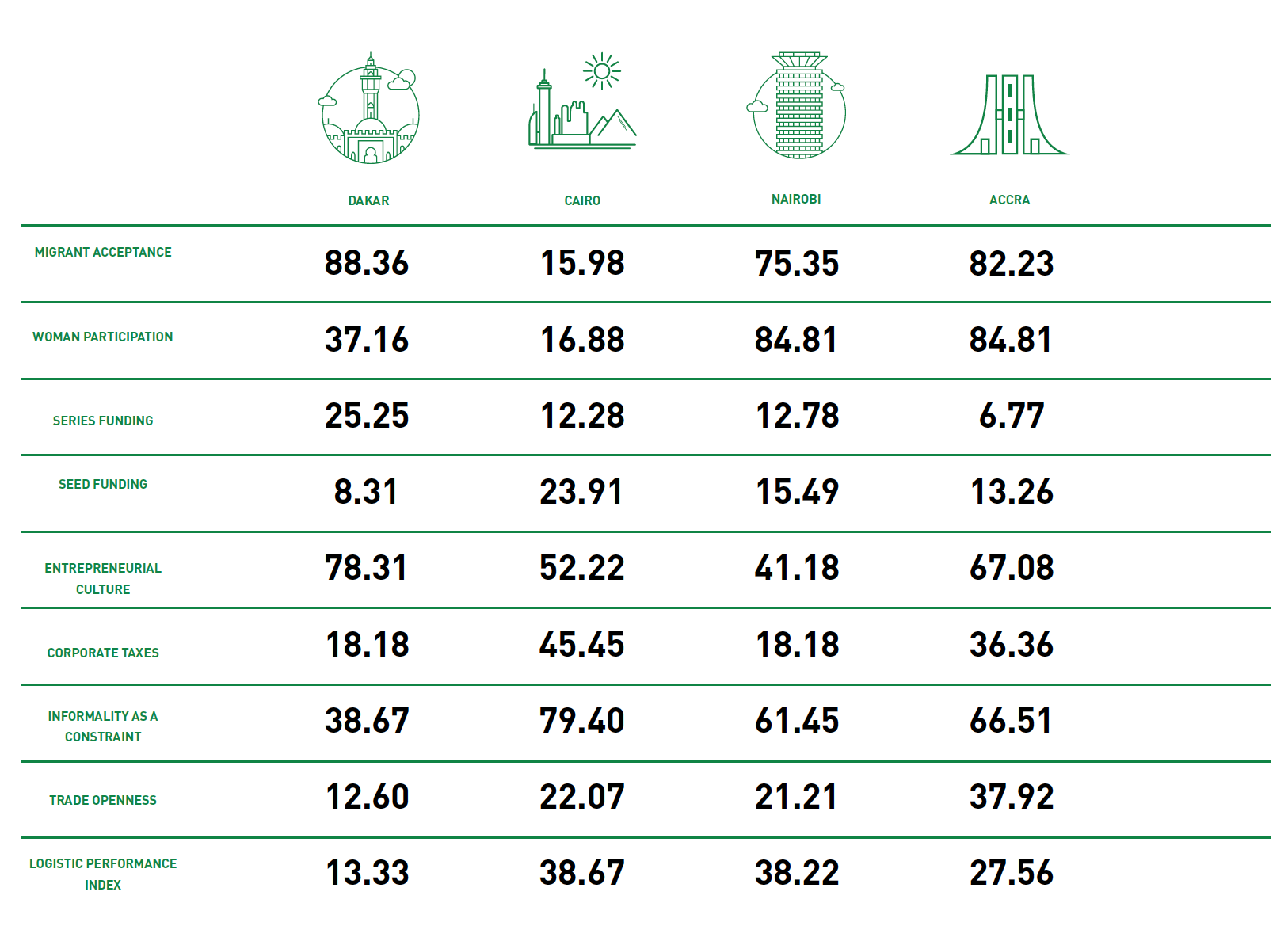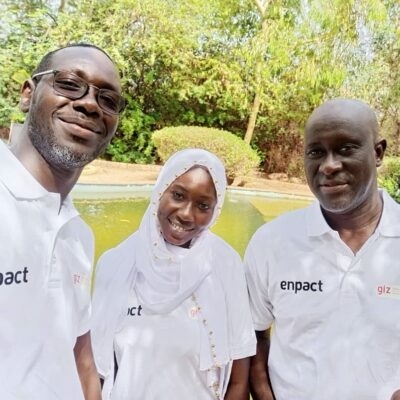
Senegalese and African regional ecosystems in Comparison
Baseline Factors
In enpact’s Data & Research team, we work on comparing startup ecosystems across different cultures, economic systems, and under different contexts. To this end, we consider several identifiers that we deem necessary to begin to build a startup ecosystem. Primarily, these factors relate to infrastructure and governance, without which simple things like connecting to the internet reliably or protecting property rights hinder the average person’s ability to start and maintain a business.

1. Dakar is quite expensive
As the most important city in Senegal, Dakar draws a certain rural exodus in search of better opportunities as well as foreign investors. This results in limited living space and, at times, uncompetitive prices for goods and services, driving up the cost of rents, land, wages, groceries, and hospitality. Ultimately, although Dakar is more expensive than the average African city, it is less expensive than most countries in advanced economies, and it is not among the most expensive cities in Africa.
2. Internet is expensive but not necessarily of high quality
In Senegal, average wages are about $161 USD per month, with the minimum wage set at $101.53 USD per month. In this context, the average internet cost of $68.03 USD per month is extremely expensive considering the standard of living. Coupled with that, although Dakar has a more than average connection, there are several reports that the internet is not very stable.

3. Dakar’s startup scene is still nascent but growing and can serve as the blueprint for francophone Africa
In Dakar, a lot of momentum is building to make the city the next hub of startups. As mentioned previously, Senegal’s Startup Act is the first of its kind in West Africa, and Senegal is the only country in the region that has adopted this framework. This has led other countries to start thinking about implementing similar policies. Currently, the question is ‘who has adopted this Startup Act?’. In the future, the main question will be: ‘which countries have not yet adopted this type of framework?’. Ghana is, for example, starting discussions to implement similar support to drive startup growth.
In addition to its Startup Act, Senegalese policy makers have restructured their mentoring and support programs to support numerous types of startups and small businesses. In the place of a single organisation for a specific type of startup such as the DER/FJ, there are also institutions for funding, while others are specialized in trainings, ecosystem building, mentoring, microfinancing, or entrepreneurship with a focus on agri-business. There is also a strong collaboration between public institutions and private ecosystem builders within the ecosystem.
4. Senegalese startups don’t let informality get in the way of starting or growing their startup … but maybe they should.
As an economy influenced by a strong entrepreneurship culture, Senegal has a high number of startups and entrepreneurs. Few firms report informality as a constraint. However, most of them stay within the informal sector despite government regulations and policies put in place to facilitate their formality.
While not reported as a significant barrier to startup culture, there are nonetheless issues with a large informal sector. The more formalized economies are, the better governments can govern. Formalized businesses create a stronger tax base that can be reinvested into funding, training and support for startups, not to mention other social programs such as pensions, healthcare, and infrastructure.
However, as previously mentioned, there are noted benefits to the informal sector that may benefit some startups, particularly ones that may not meet the financial threshold to cover tax obligations. It may also lower the psychological barrier to starting an enterprise — where uncertainty in their ability to sustain the business may cause some entrepreneurs to delay registration. This is also beneficial for those who are macro service providers. This method also provides direct employment where formal jobs are limited (a thoroughly documented issue in Senegal) although the gains and benefits are not necessarily considered inside the economy.

differentiators
While baseline factors are certainly necessary to a startup ecosystem, there is a big gap between meeting a prerequisite and flourishing as a startup ecosystem. For this, we look towards a different set of crucial factors, the differentiators. These factors are named as such because a given ecosystem’s performance can set it apart (or, inversely, hold it back) in its attempt to compete with other cities globally.

1. Universities are a vital part of the ecosystem
Despite the partnerships with reputable French universities, there are no full, affordable university programs that allow Senegalese students to receive the same education or title as their French counterparts. On a more positive note, universities play a massive role in the ecosystem as incubators. The reliance on universities as incubators directly funnels talented youth into the startup ecosystem. Investments in universities such as Bambey University are a perfect example of this trend.
2.Women participation in the workforce is low compared to Kenya and Ghana but better than in Egypt
The low female participation in the workforce represents an obstacle in as much as that the available human capital is not used. However, there have been positive changes in this area. If more people with high-level skills enter the labor market, more competition and consequently a better overall performance of the economy follows. Perhaps due to the high level of informality, women are not participating in the economy as much as in other countries on the continent. Another likely factor is that the type of professional positions that women occupy tend to be less formal and therefore not represented in the statistics (common throughout all global economies with labor such as caretaking).
A study shows that, around 32% of entrepreneurs are female in Senegal . Despite this percentage being significantly low, relative progress was recorded between 2007 to 2014 which saw the increase in female owned startups from 23% to 32%. To be noted is that women face more challenges than men to be economically included. For example, sons and daughters don’t have equal rights to inherit assets from their parents, representing a disadvantage in self-financed entrepreneurship and access to generational wealth for women. To be able to address this downfall of the ecosystem, holistic improvements must be addressed.
3. Senegal exhibits a remarkable entrepreneurial culture
Senegal has the best overall score in Entrepreneurial Culture among all measured countries – not just in the region, but on our global SFI index. Only less than 16% of Senegalese affirm that they gave up on a business idea due to the fear of failure. More than two thirds of Senegalese have intentions of starting their own business and even more perceive entrepreneurship as a good career path.
4. The macro-political context is not generally noted as a problem within the ecosystem, but Senegal still struggles with informality more than other major ecosystems
Due to high registration costs in comparison with other ecosystems, most businesses prefer to stay in the informal sector. This can be witnessed in comparison to Tunisia and Ghana, for example, where Tunis scores 93.43 and Kumasi 75.78, while Dakar scores 64.59 on the Business Registration cost subdomain. Also, research from Brookings and the World Bank shows that most informal firms in Senegal produce on a lower scale and earn too little to reach the tax threshold, which would represent too much of a cost burden to register.
Additionally, it is difficult on the part of the government to set out punitive measures against informal businesses. Studies from the World Bank show that punitive measures like evicting informal vendors are tricky and dangerous as informal businesses directly contribute to “crucial livelihoods to the most vulnerable of the urban poor”. A cautious approach should be taken when dealing with informal businesses, which should focus on formalizing and unleashing the untapped entrepreneurial potential of such economies.
5. Senegal shows a low logistic performance index
Based on a World Bank Index that considers the conditions of trade logistics (quality and capacity of ports), fees and costs (licenses, export and import fees, trade taxes, etc), and efficiency of trade (quantity, capacity, and time), Senegal performs lower than other countries on the continent. A low logistic performance index decreases the trade competitiveness of an ecosystem and can affect the overall economy by not participating in global trade partnerships and production chains.







